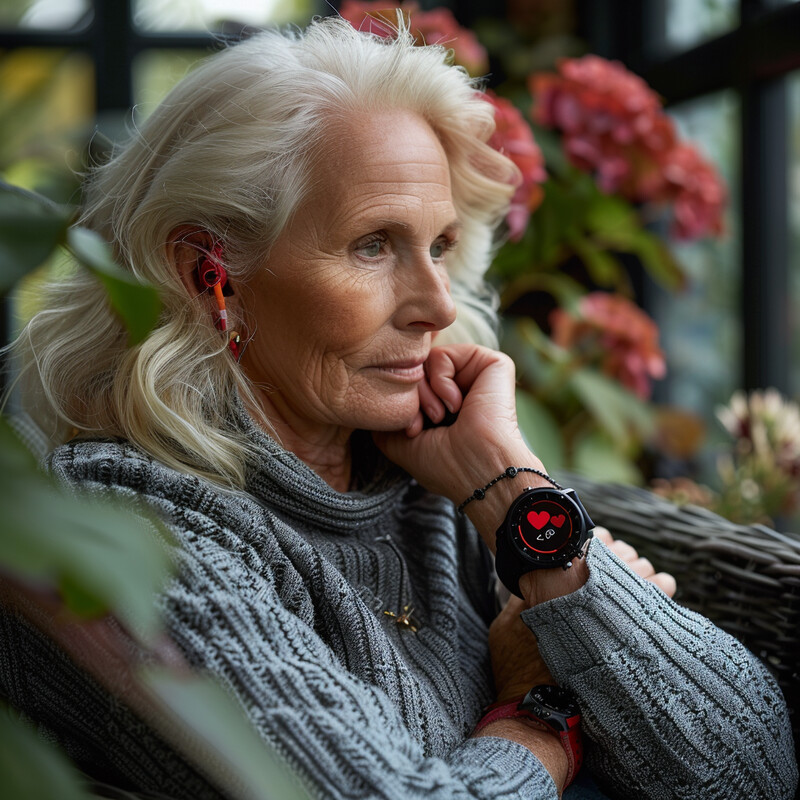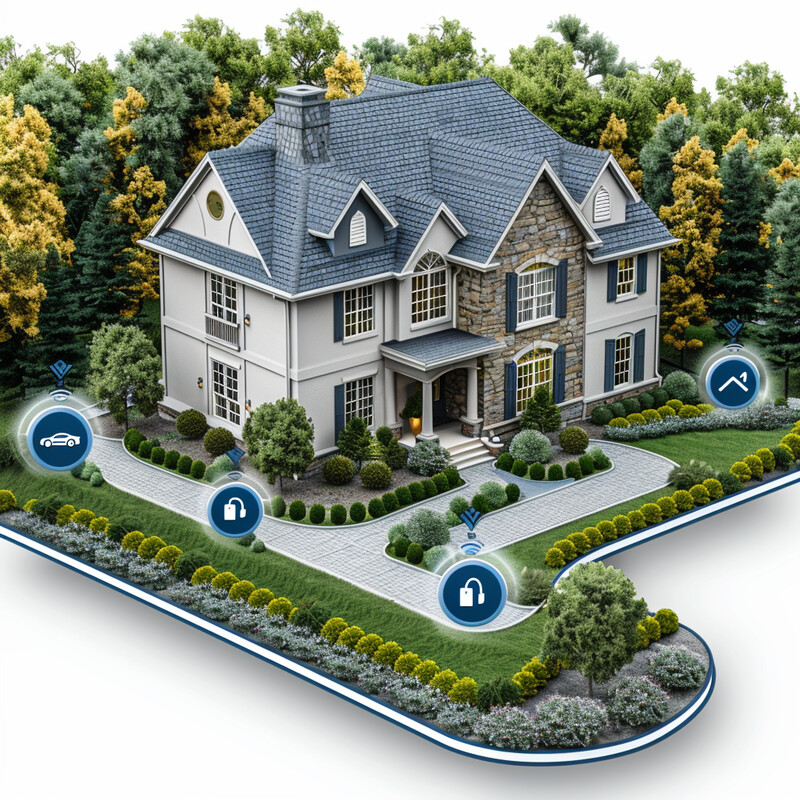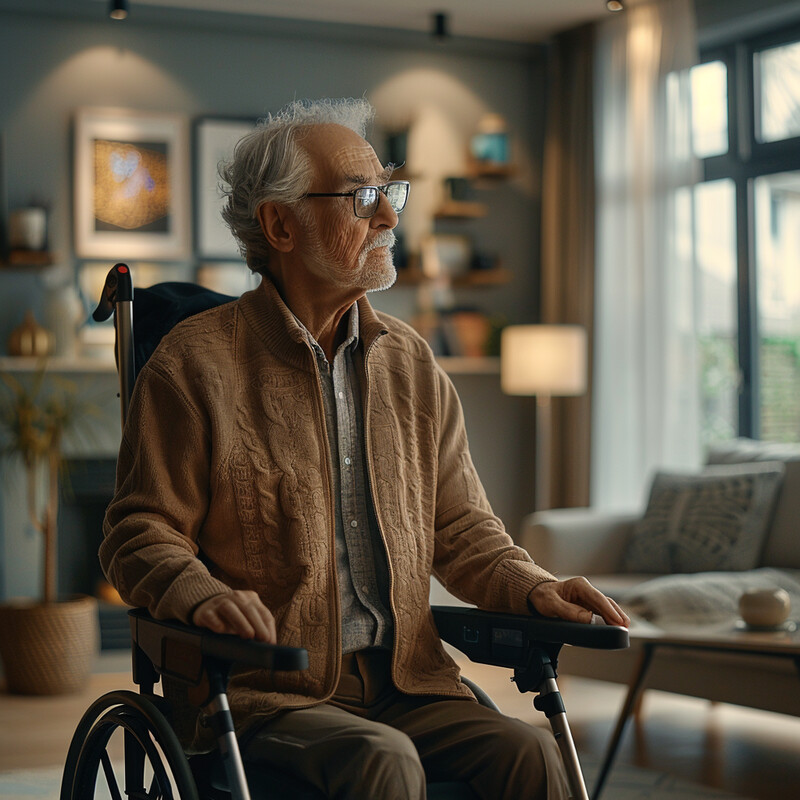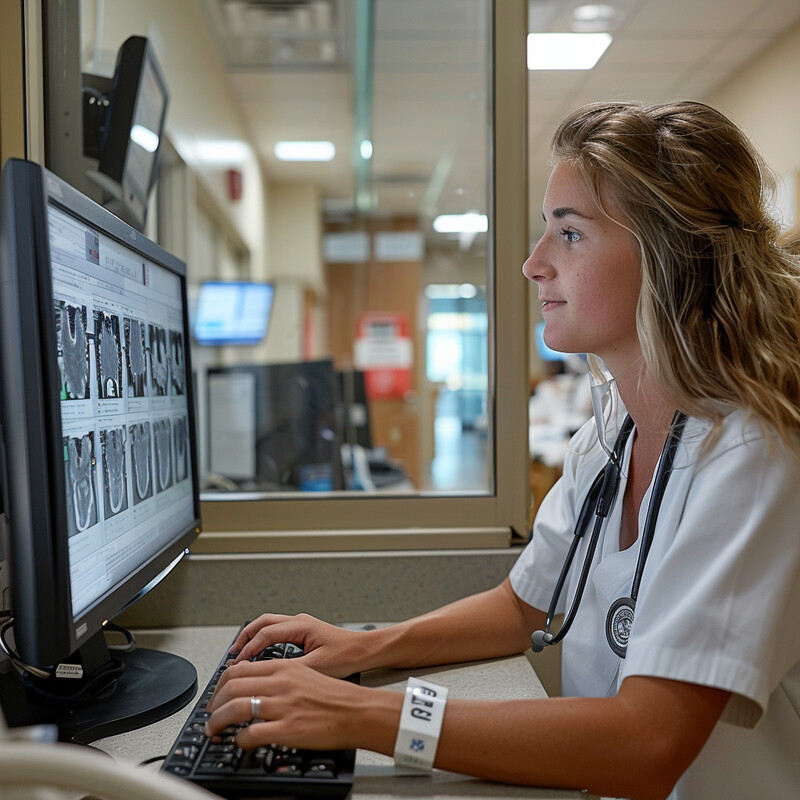1. Health Monitoring
AI is playing a growing role in continuous health monitoring for seniors. Wearable devices and home sensors can track vital signs (like heart rate, oxygen levels, or blood pressure) in real time. AI algorithms analyze these streams of data to detect early warning signs of illness or deterioration, often before a human would notice. For example, an AI may flag subtle changes in a patient’s weight or heart rhythm that suggest worsening heart failure, prompting a timely intervention. By continuously watching over chronic conditions, AI-driven monitoring helps seniors manage diseases like diabetes or hypertension more proactively. In essence, AI extends the reach of healthcare into the home, enabling preventative care – catching potential problems early and reducing the need for emergency interventions.

The benefits of AI-enhanced monitoring are evident in reduced hospital visits and improved outcomes. One notable example is UMass Memorial Health’s remote monitoring program for heart failure patients, which combines AI analytics with human care teams. Using connected scales and blood pressure cuffs at home, the system alerts nurses to concerning trends so they can intervene. The results have been striking: this AI-augmented program cut 30-day readmissions for heart failure by 50% by enabling early action on concerning health data. Such success highlights how continuous AI health monitoring can keep seniors healthier at home and avoid costly hospitalizations.
2. Fall Detection and Alert Systems
Falls are a major risk for the elderly, and AI is making fall detection faster and more accurate. Traditional fall alert systems (like emergency pendants) rely on seniors pressing a button for help, which may not happen if they’re unconscious or confused after a fall. AI-powered fall detection, by contrast, uses sensors and machine learning to automatically recognize when a person has fallen. Modern smartwatches and home cameras have AI algorithms that distinguish falls from normal movements, triggering an alert to caregivers or emergency services within seconds. Emerging systems are also predictive – by analyzing gait or balance data, AI can sometimes forecast a high risk of falling and prompt preventive measures (such as exercises or assistive devices). In short, AI is transforming fall management from reactive to proactive, potentially saving lives by speeding up response times and even preventing some falls altogether.

AI-based fall detectors today achieve very high accuracy, significantly outperforming older alert devices. For instance, researchers have developed deep learning models using wearable sensor data that can detect falls with near-perfect precision in testing. In one 2024 study, a wearable AI system correctly recognized falls with over 99% accuracy on test data, and it maintained about 96% accuracy in real-world pilot trials. These systems not only recognize falls but also minimize false alarms thanks to advanced pattern recognition. With such reliability, AI fall detection tools are increasingly trusted to automatically summon help – a crucial capability given that quick medical attention after a fall can greatly reduce complications for seniors.
3. Medication Management
Managing medications is complex for many older adults, and AI is helping ensure they take the right pills at the right times. Seniors often juggle multiple prescriptions (a situation known as polypharmacy), which raises the risks of missed doses, overdoses, or dangerous drug interactions. AI-driven medication management tools tackle this in several ways. Smart pill dispensers use AI to schedule and dispense meds and send reminders or alerts if a dose is missed. Smartphone apps with AI can personalize medication schedules and adjust reminders based on a person’s routine or habits. Beyond adherence, AI also helps in reviewing medication regimens: algorithms analyze patient data and flag potentially inappropriate drugs or risky combinations that a doctor should re-evaluate. By providing tailored reminders, tracking intake, and analyzing medication risks, AI is supporting seniors and caregivers in keeping complex medication plans safe and effective.

The impact of AI in medication management is evident in better safety and fewer adverse events. For example, recent advances use AI to identify which older patients are at high risk from medication issues so clinicians can intervene. A 2024 study at Brigham and Women’s Hospital evaluated an AI platform (“FeelBetter”) designed to monitor polypharmacy risks in seniors. The system was tested on over 108,000 older patients’ records and demonstrated impressive accuracy: it correctly identified medication-related risk warnings in 89.2% of cases, and clinicians found that 97.3% of the AI’s alerts were useful in optimizing care. In other words, the AI was very effective at catching potential medication problems (like dangerous drug interactions or non-adherence) and its guidance was deemed clinically relevant almost every time. By catching these issues, such AI tools can help prevent medication errors, adverse drug reactions, and hospitalizations due to medication mismanagement, ultimately improving safety for elderly patients with complex prescriptions.
4. Mobility Assistance
AI is enabling new forms of mobility support for older adults, helping those with physical limitations move more safely and independently. One area of innovation is “smart” mobility aids – such as walkers and wheelchairs enhanced with AI for navigation and stability. These devices can detect obstacles and adjust to prevent collisions or falls (for example, an AI-powered walker that brakes if it senses the user is losing balance). Another leap forward is in robotic exoskeletons and wearable assistive devices. These are machines that a person can wear on their legs or hips to augment muscle strength and coordination. AI algorithms in these exosuits learn an individual’s gait and provide just the right amount of support at each step, effectively reducing the effort needed to walk or climb stairs. By adapting in real time to a user’s movement and fatigue level, AI-driven mobility aids can restore confidence in walking and performing daily activities. Over time, such AI assistance could mean fewer falls, greater endurance, and extended independence for seniors who might otherwise become homebound due to mobility issues.

Early studies show that AI-enhanced mobility devices can measurably improve walking efficiency and reduce strain for older users. For instance, researchers in 2024 introduced a pair of “smart robotic shorts” (a soft exoskeleton) designed to assist hip movement in the elderly. In tests with older adults, wearing this AI-driven device reduced the metabolic energy cost of walking by about 10.5% compared to walking without assistance. Participants reported that the robotic assistance felt natural and did not reduce their sense of control over their legs. Similarly, other AI-trained exoskeletons have demonstrated over 20% reductions in energy expenditure for walking in younger us. These improvements mean an older person can walk farther or climb stairs with less fatigue when using AI-assisted devices. Such outcomes hint at a future where seniors with mobility impairments can maintain an active lifestyle, aided by AI-powered exoskeletal support that boosts their strength and endurance.
5. Cognitive Assistance:
AI is increasingly used to support cognitive health and independence for seniors, especially those experiencing memory loss or early dementia. One application is AI-powered reminder systems and virtual assistants. These can provide gentle prompts about daily tasks – for example, reminding someone to take their keys, turn off the stove, or attend an appointment, simulating the memory support a caregiver might offer. AI chatbots and companion robots are also being introduced as memory aides and cognitive engagement tools. They can have simple conversations, play brain games, or answer questions like “Did I take my medicine today?”, helping to keep the mind active and reduce confusion. Another emerging role of AI is in early detection of cognitive decline: by monitoring speech patterns, typing habits, or even walking gait, AI algorithms can detect subtle changes that might indicate early dementia, enabling earlier intervention. Overall, AI aims to function like a smart assistant for the aging brain – aiding recall, maintaining routines, and providing companionship – to help older adults maintain their autonomy and mental sharpness longer.

Recent research shows that AI can both detect cognitive issues earlier and assist in day-to-day memory management. Notably, advanced AI models are proving capable of catching signs of dementia that traditional tests might miss. A 2025 scoping review reported that a speech-based AI model was more sensitive than standard clinical cognitive screening at identifying early dementia. By analyzing how older adults speak (for instance, subtle changes in vocabulary or fluency), the AI could flag cognitive impairment sooner, which is crucial for timely care. On the assistance front, teams like MIT’s Media Lab have prototyped wearable memory aids (“digital companions”) that use AI to help with recall – for example, recognizing objects the user has interacted with and answering questions like “Where did I leave my glasses?” Feedback from initial trials indicates older users find such AI memory assistants helpful for reducing daily frustration. Additionally, AI-driven reminder apps have shown high adherence rates, suggesting seniors are willing to trust and use these tools. Together, these developments demonstrate AI’s emerging role as a cognitive partner: identifying when an elder’s cognitive abilities are changing and providing support to compensate for memory lapses in everyday life.
6. Personalized Care Plans
AI is enabling more personalized and data-driven care plans for elderly patients. Instead of relying solely on generalized protocols, healthcare providers can now leverage AI to tailor care to each individual’s unique health profile. This often involves feeding an AI system with a senior’s medical history, current conditions, medication list, lifestyle factors, and even genetic information. The AI can identify patterns and recommend a customized set of interventions – for example, suggesting specific exercise programs for someone’s mobility level, dietary changes suited to their conditions, or scheduling more frequent check-ins during periods of higher risk. AI can also continuously adjust the care plan: if it detects that an intervention isn’t working (say, blood sugar levels remain high despite a change in medication), it can prompt clinicians to try an alternative sooner. In essence, AI acts as a smart coordinator, ensuring the care plan evolves with the patient’s needs. This level of personalization is especially valuable in geriatrics, where patients often have multiple chronic conditions and very individual responses to treatments.

The shift toward AI-guided, personalized care is already underway in many health systems, with evidence of improved patient engagement and outcomes. Surveys of geriatric care professionals indicate strong optimism that AI can enhance care planning. According to one analysis, AI has the potential to greatly improve geriatric care by providing personalized treatment plans, real-time health monitoring, and decision support for clinicians. In practice, this means an AI might analyze an older patient’s data and help formulate a tailored plan – for instance, adjusting physical therapy intensity to match the patient’s recovery progress or predicting which patients will benefit from a certain drug. Hospitals in 2023 reported that about 65% are integrating some form of AI or predictive analytics into their electronic health records to stratify patients by risk and personalize interventions. Early pilots show promising results: personalized AI recommendations have led to better medication adherence and satisfaction, as patients feel their care is more “in tune” with their lives. While still emerging, AI-driven personalized care planning is expected to reduce one-size-fits-all approaches, leading to more efficient care and better quality of life for seniors under these customized plans.
7. Anomaly Detection in Daily Activities
AI-powered smart home systems are revolutionizing how we ensure the well-being of seniors who live alone. These systems continuously learn an individual’s normal daily routine – what time they usually get out of bed, how often they open the refrigerator, when they take meals, and so forth. Once the AI has a baseline for “normal” behavior, it can quickly spot deviations or anomalies that might signal a problem. For example, if an elderly resident typically prepares breakfast every morning but the kitchen sensors detect no activity one morning, the AI system might flag this and send an alert to a caregiver or family member to check in. Similarly, if a usually active person hasn’t left their bedroom by a much later time than usual, the system notes this irregularity. By detecting these subtle changes (which could indicate issues like a fall, illness, or confusion), AI-driven monitoring provides a safety net. It gives caregivers peace of mind that they’ll be notified of potential emergencies or health declines without infringing too much on the senior’s privacy or independence.

Smart home anomaly detection has moved from concept to reality, showing real-world success in trials. In one proof-of-concept deployment in Sweden, researchers equipped single-resident senior homes with simple motion and door sensors and used AI to learn each person’s daily patterns. Over a few months, the system observed thousands of routine activities (like meal preparations and bathroom visits) and sent automatic alerts when behaviors fell outside the normal range. The outcomes were encouraging: the AI’s notifications closely matched actual deviations as confirmed by users, correctly classifying about 93% of meal-related activities as normal events. Importantly, the seniors and their families reacted positively – user experience was rated 4 out of 5 on average, indicating “very good” satisfaction with the system. Such feedback suggests that older adults are comfortable with discreet AI monitoring when it demonstrably enhances their safety. Today, companies are beginning to offer commercial smart-home eldercare systems that use anomaly detection to alert caregivers if, say, the front door hasn’t opened all day (possibly meaning the person didn’t retrieve the mail) or if nighttime bathroom visits suddenly spike (possibly indicating a health issue). By catching these anomalies early, AI systems help ensure timely assistance, preventing small issues from escalating into serious health crises.
8. Social Interaction Enhancement
Combating loneliness and social isolation is a big focus in elderly care, and AI is increasingly used to enrich social interactions for seniors. One approach is through socially assistive robots – machines like robotic pets or humanoid companions that engage older adults in conversation and activities. These AI-driven robots can tell stories, play music or games, and even crack simple jokes, providing companionship to seniors who may not have frequent visitors. They are also used in dementia care to stimulate interaction; for example, a cute robotic seal named Paro has been used in nursing homes to calm patients and encourage them to communicate and express emotions. AI chatbots are another tool, available on smartphones or smart speakers, which can engage an older person in dialogue at any time – asking them how they’re feeling, reminding them of loved ones’ upcoming birthdays, or guiding them through memory exercises. Additionally, AI is helping seniors connect with other people: platforms can match older adults with shared interests for virtual chats, or automatically schedule video calls with family (and even prompt conversation topics if memory lapses). Altogether, these technologies aim to reduce feelings of loneliness, keep seniors mentally and emotionally engaged, and supplement human contact when it’s lacking.

There is growing evidence that AI-based social interventions can improve mood and social engagement among older adults, particularly those with dementia. A 2024 meta-analysis of 14 randomized controlled trials examined the effects of socially assistive robots on seniors living with dementia. The findings were promising: interacting with these AI companions significantly reduced symptoms of depression and anxiety, and it improved social interaction – participants were more willing to converse and showed more positive emotions during robot sessions. For example, some patients who were withdrawn began talking to the robot or smiling when it engaged them, whereas they had been unresponsive before. However, the study also noted that while mood and interaction improved, the robots did not greatly change more severe agitation or overall cognitive function, indicating they are a supplement to, not a replacement for, human care. In everyday settings, care facilities have reported that robotic pets and AI companions often become “social catalysts,” prompting group conversations among residents about the robot or just lifting spirits in the room. Family members of home-bound seniors using an AI chatbot have similarly observed that their loved ones seem less lonely and look forward to “chatting” with their virtual friend. These outcomes illustrate AI’s potential to enhance social well-being – by providing not just monitoring or reminders, but a form of companionship and emotional support to older adults.
9. Automated Documentation and Reporting
AI is streamlining the paperwork and reporting burden in elderly care, allowing healthcare providers to spend more time with patients and less on charts. In settings like nursing homes, home care, and clinics, there is a huge amount of documentation – caregivers must log vital signs, write shift reports, update care plans, and more. AI tools, such as speech-to-text transcription services and intelligent document processors, are now handling much of this work. For instance, a nurse can simply speak a summary of their visit with a senior, and an AI system will transcribe and format it into the electronic health record. Some AI “scribes” listen during exams or home visits and automatically generate detailed clinical notes. Additionally, AI can pull together data for regular reports – like weekly health status updates for a family or compliance reports for a healthcare regulator – by automatically collating information from various sources (vital sign trends, medication logs, etc.). By automating these tedious tasks, AI not only saves professionals time but also reduces errors (illegible handwriting and forgotten details are eliminated). In turn, caregivers can focus on direct patient interaction, and organizations can maintain more accurate and timely records of each elder’s care.

The efficiency gains from AI-driven documentation are significant. Studies and early implementations have found that using AI for charting and reporting dramatically cuts down the time clinicians spend on paperwork. For example, AI-based medical documentation assistants (employing natural language processing to write notes) can reduce the time a physician or nurse devotes to documentation by up to 70%. In practical terms, what used to be an hour of end-of-day paperwork might become just 15–20 minutes with AI handling the brunt of the work. One survey at a hospital found that most clinicians reported lower burnout when an AI scribe was introduced, because it relieved the nightly burden of writing up patient notes. In long-term care facilities, automated reporting tools compile daily care logs and incident reports with minimal human input, ensuring important information is never skipped. By 2025, roughly two-thirds of U.S. hospitals and many senior care providers have at least piloted AI documentation systems, and many report that providers are able to see one additional patient per day on average due to the time saved. This evidence underscores how AI’s talent for data handling is directly benefiting elder care management: not only is documentation faster, but the records can also be more thorough, standardized, and easily sharable with the care team.
10. Predictive Analytics for Long-Term Health Management
One of AI’s most powerful contributions in elderly care is its ability to analyze large amounts of health data and predict future health events or needs. This predictive analytics capability means that instead of reacting to health crises (like a hospitalization or a sudden decline in health), providers can anticipate and prevent them. For instance, AI models can estimate an elderly person’s risk of hospitalization in the next year by looking at patterns in their medical records – such as vital sign trends, lab results, weight changes, and even social factors. If the risk is high, proactive measures (like a home nurse visit or medication adjustment) can be taken to avoid a hospital trip. Predictive AI is also used to foresee the progression of chronic diseases: it might forecast when a patient with heart failure is likely to have an acute episode or predict the rate of cognitive decline in someone with mild dementia. In home care, AI systems monitor real-time data (from wearables or smart home sensors) to catch early signs of trouble – for example, slight increases in nighttime restlessness could predict a urinary tract infection. By peering a bit into the future, AI helps care teams make informed decisions early, tailoring long-term care plans to each individual’s evolving risks and thereby maintaining their health and independence longer.

Cutting-edge implementations of predictive analytics are already yielding remarkable results in elder care. In the UK’s National Health Service, for example, an AI tool was rolled out in 2025 that analyzes vital signs and daily health inputs for home care patients to predict falls and other health deteriorations before they happen. The system, used in millions of home visits, proved capable of predicting an elderly patient’s fall risk with 97% accuracy, enabling interventions like physical therapy or home modifications to prevent falls. This program is reported to be preventing as many as 2,000 falls and related hospital admissions every day by flagging high-risk individuals early. Additionally, by catching warning signs of conditions like dehydration or infections, the same tool has helped reduce emergency hospitalizations by up to 70% in some regions. These are astonishing numbers that highlight AI’s preventative power. In another case, researchers at a U.S. health system developed an AI model that predicted which seniors would benefit most from a care management program, leading to a measurable drop in emergency visits among that group once the program was applied. From fall risk to heart failure flare-ups to medication-related problems, predictive analytics is turning reactive elder care into proactive care. As more data become available (from electronic health records, wearable devices, genome tests, etc.), AI’s predictions are expected to get even more accurate, further transforming long-term health management for the elderly.